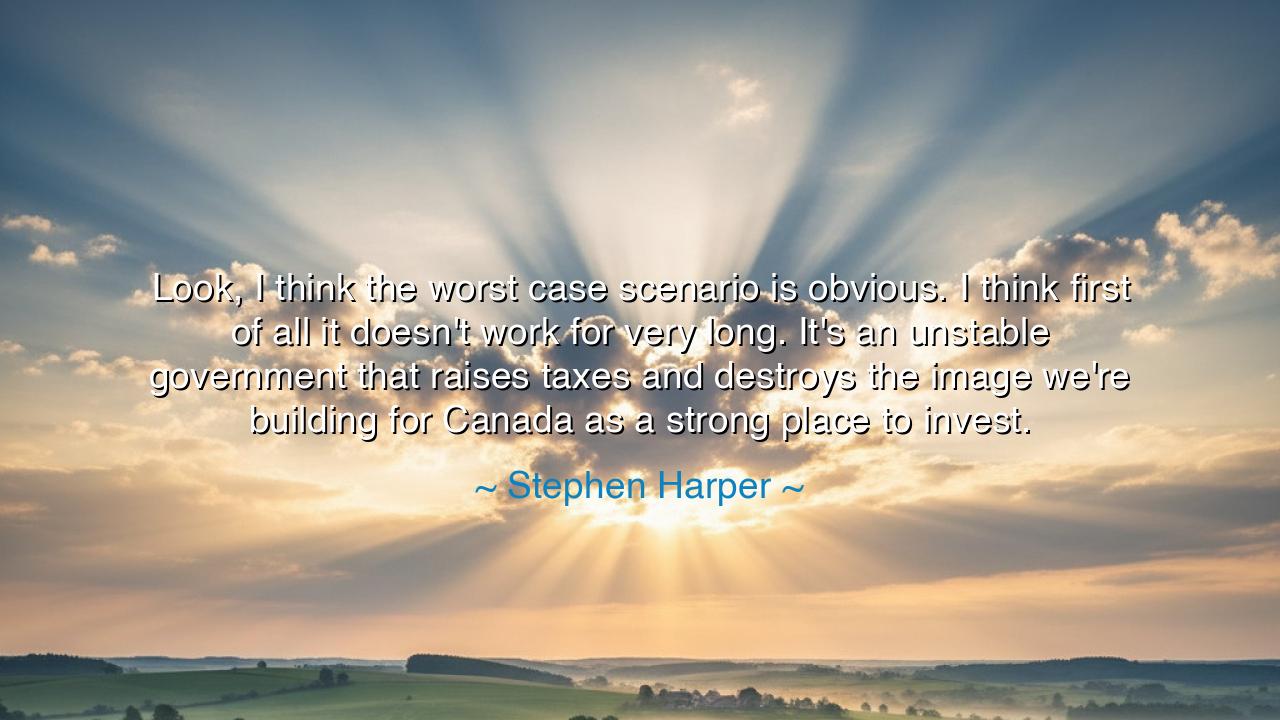
Look, I think the worst case scenario is obvious. I think first
Look, I think the worst case scenario is obvious. I think first of all it doesn't work for very long. It's an unstable government that raises taxes and destroys the image we're building for Canada as a strong place to invest.






Hear, O listeners of reason and guardians of prosperity, and consider the words of Stephen Harper, who once warned: “Look, I think the worst case scenario is obvious. I think first of all it doesn't work for very long. It's an unstable government that raises taxes and destroys the image we're building for Canada as a strong place to invest.” Within this statement lies a meditation upon the fragility of governance, the delicate harmony between stability and prosperity, and the peril that arises when politics abandons prudence. Harper, a leader forged in the crucible of economic stewardship, spoke these words not merely as a politician defending policy, but as a sentinel cautioning against the unraveling of the nation’s economic and moral fabric.
To understand his meaning, we must recall the age in which he spoke. In the early years of the twenty-first century, Canada stood as a beacon of economic resilience and fiscal discipline, weathering storms that had shaken much of the global economy. Harper’s government had pursued policies of low taxation, controlled spending, and international confidence-building—seeking to carve for Canada a place among the world’s most stable economies. Yet even amidst such success, he saw the gathering clouds of instability: coalitions formed not from shared vision but from opportunistic alliances, and economic policies designed not for endurance but for short-lived applause. It was this danger—of unstable governance and reckless taxation—that stirred his warning.
Harper’s words speak to an ancient truth about nations: that stability is the bedrock of prosperity. A government divided within itself, or one that chases popularity through fleeting promises, can never nurture lasting wealth or trust. Just as a tree cannot flourish when its roots are disturbed, so too does a country falter when its policies shift with every political wind. His emphasis on the image of Canada as a strong place to invest reveals that reputation, once lost, is not easily regained. For the faith of investors and citizens alike rests not only on economic numbers, but on the perception of steady, principled governance.
History offers sobering mirrors of this truth. In the 1970s, the once-mighty economy of Britain stumbled into crisis. Spiraling taxes, unstable coalitions, and weak fiscal control led to inflation, stagnation, and the loss of investor confidence. The government’s inability to maintain unity or discipline caused industries to falter and currencies to weaken. It took years of painful reform to restore credibility. In that story, as in Harper’s warning, we see that instability and excessive taxation are twin destroyers of national vitality—they weaken both spirit and enterprise.
Yet Harper’s statement is not merely economic; it is deeply moral and philosophical. He implies that governance must be guided by principle, not expedience. A stable government is not one that avoids conflict, but one that stands firm upon consistent ideals—discipline, fairness, and responsibility. To raise taxes irresponsibly, or to sacrifice long-term prosperity for short-term gain, is not only a political misstep but a betrayal of the trust placed by citizens. For when a government loses sight of prudence, it endangers not only wealth but the very faith of the people in their institutions.
There is also within Harper’s words a call to the citizens themselves. For a people who desire stability must themselves cultivate patience, discernment, and vigilance. It is easy to demand immediate relief, to cheer promises of increased spending or lower burdens without foresight. But every democracy, Harper reminds us, survives only when its people support the principles that make endurance possible. Citizens must think as stewards, not consumers of their nation’s fortune, understanding that stability and investment are the fruits of restraint and integrity.
The lesson, therefore, is clear and timeless: a nation’s strength is built upon the marriage of prudence and stability. Governments must act with foresight, balancing compassion with discipline, and citizens must reward vision rather than rhetoric. A stable state invites growth, innovation, and trust; an unstable one invites doubt, withdrawal, and decline. Let each generation, therefore, remember Harper’s counsel—not as a partisan cry, but as a universal truth of governance: that prosperity cannot survive chaos, and that the greatest act of leadership is to build not for the moment, but for the enduring confidence of the future.
Thus, his words echo across the ages as both warning and wisdom: that economic integrity and political stability are not luxuries—they are the lifeblood of freedom itself. When a nation guards these, it stands as a beacon to the world; when it neglects them, it drifts toward the shadows of decline.






AAdministratorAdministrator
Welcome, honored guests. Please leave a comment, we will respond soon